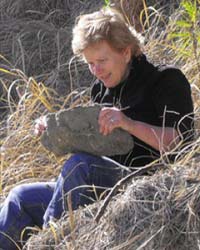Curator of Invertebrates, Museum of Geology -
Laurie C. Anderson
 Laurie
C. Anderson, Ph.D. is the Curator of Invertebrates and previous of the Museum of Geology and the interim Vice President of Research Affairs at South Dakota Mines. She received a B.A. (summa cum laude) in geology, biology, and music from the University of Minnesota,
Morris in 1985. She earned a M.S. in geology from Bowling Green State University in 1987, receiving an Amoco Foundation Geology Fellowship. Her thesis project was a paleoenvironmental reconstruction of the Pliocene Pinecrest sand of southwestern Florida
based on ostracod assemblages. She pursued a Ph.D. in geology at the University of Wisconsin-Madison, earning her doctorate in 1991. Her dissertation research examined gastropod predation patterns on bivalves in the Neogene of tropical America, as
well as explored the interplay of paleoenvironment and morphometric patterns in Neogene corbulid bivalves, especially form the northern Dominican Republic. While at Madison she received both a Wisconsin Alumni Research Foundation Fellowship and a
Shell Companies Foundation Fellowship.
Laurie
C. Anderson, Ph.D. is the Curator of Invertebrates and previous of the Museum of Geology and the interim Vice President of Research Affairs at South Dakota Mines. She received a B.A. (summa cum laude) in geology, biology, and music from the University of Minnesota,
Morris in 1985. She earned a M.S. in geology from Bowling Green State University in 1987, receiving an Amoco Foundation Geology Fellowship. Her thesis project was a paleoenvironmental reconstruction of the Pliocene Pinecrest sand of southwestern Florida
based on ostracod assemblages. She pursued a Ph.D. in geology at the University of Wisconsin-Madison, earning her doctorate in 1991. Her dissertation research examined gastropod predation patterns on bivalves in the Neogene of tropical America, as
well as explored the interplay of paleoenvironment and morphometric patterns in Neogene corbulid bivalves, especially form the northern Dominican Republic. While at Madison she received both a Wisconsin Alumni Research Foundation Fellowship and a
Shell Companies Foundation Fellowship.
In 1991, Dr. Anderson joined the faculty in the Department of Geology & Geophysics at Louisiana State University and held the rank of assistant professor (1991-1997), associate professor (1997-2011), and department chair (2003-2007). Dr. Anderson
also served as an Adjunct Associate Curator in the LSU Museum of Natural Sciences from 1998 to 2011. While at LSU, Dr. Anderson received the College of Basic Science Research Award, Dr. Henry V. Howe Distinguished Professorship, and the Harrison Family
Field Camp Professorship. She also received several commendations for excellence in teaching and a best paper award from the Journal of Paleontology (for 2003). Her sabbatical appointments included a Temminck Fellowship at the National Natural History
Museum (Naturalis) in Leiden, the Netherlands. Dr. Anderson has a species named after her, Pachydon andersonae Wesselingh 2006, an extinct freshwater bivalve from western Amazonia.
The primary foci of Dr. Anderson’s research are the paleobiology, paleoecology, taphonomy, and phylogeny of mollusks, particularly the Bivalvia. Her work combines field research in both modern and ancient settings, museum studies, and laboratory
analyses. Her teaching focuses on the biological history of Earth/geologic history of Life, and she especially enjoys teaching field courses.